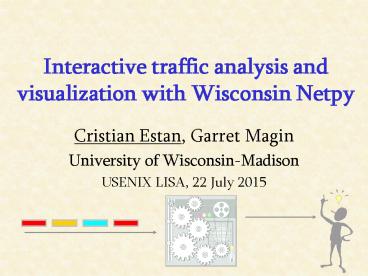Cristian Estan, Garret Magin - PowerPoint PPT Presentation
Title:
Cristian Estan, Garret Magin
Description:
... Fred Moore, Jaeyoung Yoon, Brian Hackbarth, Pratap Ramamurthy, Steve Myers, Dhruv Bhoot Other help from: Mike Hunter, Dave Plonka, Glenn Fink, ... – PowerPoint PPT presentation
Number of Views:41
Avg rating:3.0/5.0
Title: Cristian Estan, Garret Magin
1
Interactive traffic analysis and visualization
with Wisconsin Netpy
- Cristian Estan, Garret Magin
- University of Wisconsin-Madison
- USENIX LISA, 22 July 2015
2
Traffic monitoring the big picture
- Tool
- MRTG (LISA 1998)
- FlowScan (LISA 2000)
- AutoFocus (NANOG 2003)
- Wisconsin Netpy (LISA 2005)
- Major new feature
- Plots traffic volume
- Breaks down traffic by pre-configured ports/nets
- Finds dominant ports/nets in current traffic
- Interactive drill-down, flexible analysis
3
Talk overview
- Hierarchical heavy hitter analysis
- Traffic analysis with Netpys GUI
- Netpys database of flow data
- Future directions
4
Example who sends much traffic?
Aproach Which sources traffic to report
Pre-configured Pre-configured servers x,y, and z
Heavy hitters (top k) Whichever IP addresses send 1 of total traffic
Hierarchical heavy hitters IP addresses and prefixes that send 1
5
Refining hierarchical heavy hitters
- Problem might generate large, redundant reports
- Example heavy hitter IP address X is part of 32
more general prefixes and all will be reported
even if they contain no traffic other than the
traffic of X - Solution Report prefixes only if their traffic
is significantly beyond that of more specific
prefixes reported (difference threshold) - Generalization can use other hierarchies that
focus on ports, AS numbers, routing table
prefixes, etc.
6
HHH report example
7
Other hierarchies used by Netpy
- Application hierarchy (source port centric)
- First group by protocol
- Within TCP and UDP separate traffic coming from
low ports (lt1024) and high ports (1024) - Separate by individual source port
- Separate by (source port, destination port) pair
- Destination port centric application hierarchy
- User defined categories
- Group traffic into categories using ACL-like
rules - Report all categories above the threshold
- Can modify mappings at run time
8
Example application HHH report
9
Overview
- Hierarchical heavy hitter analysis
- Traffic analysis with Netpys GUI
- Types of analyses supported
- Selecting data to analyze (interactive
drill-down) - Netpys database of flow data
- Future directions
10
Types of analyses supported
- Textual HHH analyses on all 5 hierarchies
- Time series plots on all 5 hierarchies
- Graphical unidimensional reports
- Bidimensional reports using two hierarchies
11
Example bidimensional report
12
Selecting data to analyze
- User selects time interval to analyze
- Can select whether to measure data in bytes,
packets, or flows (helps catch scans) - Can specify a filter (ACL-like rules) to select
the portion of the traffic mix to analyze - Clicking on graphical elements in the reports
updates the rules in the filter - This allows interactive drill-down
13
Overview
- Hierarchical heavy hitter analysis
- Traffic analysis with Netpys GUI
- Netpys database of flow data
- Grouping traffic by links
- Adding traffic through the console
- Scalability through sampling
- Future directions
14
Grouping traffic into links
- Can configure Netpy to group traffic by link
- ACL-like syntax, based on NetFlow fields
- Exporter IP address (prefix match)
- Next hop (prefix match)
- Source/destination address (prefix match)
- Input/output interface (exact match)
- Engine type/ID (exact match)
- Flow records grouped into files by start time,
separate directory for every link
15
Adding traffic through the console
- Netpys console has command for adding NetFlow
files to database - Accepts anything flow-tools can parse
- If using sampled NetFlow, specify sampling rate
- Can override link mappings from configuration file
16
Scalability through sampling
- When writing to database Netpy samples flow
records to ensure database wont get too large - Configuration file gives size limit (MB/hour)
- When reading from database, if the number of flow
records is too large even after applying the
filter, further sampling is performed - Helps speed up HHH algorithms
17
The future of Netpy
- Features on the roadmap
- Feedback, suggestions, patches all welcome
- Client/server operation
- Better performance (caching, multilevel database)
- More hierarchies (e.g. based on DNS)
- Comparative analysis of two data sets
- Anomaly detection, generating alerts
- We need your help with getting this one right
18
Questions?
- Netpy home page http//wail.cs.wisc.edu/netpy/
- Acknowledgements
- Netpy implementors Garret Magin, Cristian Estan,
Ryan Horrisberger, Dan Wendorf, John Henry, Fred
Moore, Jaeyoung Yoon, Brian Hackbarth, Pratap
Ramamurthy, Steve Myers, Dhruv Bhoot - Other help from Mike Hunter, Dave Plonka, Glenn
Fink, Chris North






























